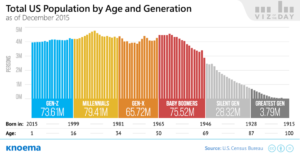 With nearly 80 million Millennials and 74 million Gen Zs – which combined make up 56.5 percent of the U.S. population[1] – these two generations are positioned to make a huge impact on the housing industry.
With nearly 80 million Millennials and 74 million Gen Zs – which combined make up 56.5 percent of the U.S. population[1] – these two generations are positioned to make a huge impact on the housing industry.
While these youngest generations may be close in age, they are quite different from each other. Their unique experiences are changing the way we buy and sell homes and are forcing many companies to examine how they do business – and will do so for decades to come.
A Closer Look at Millennials
Millennials, between the ages of 21-40, are the largest generation in history. As they move into their prime spending years, it’s important to understand how their unique characteristics are shaping how we sell to them.
 Millennials have record-level student loan debt, and because of the recession, they’ve also had difficulty finding and keeping jobs after college. As such, they had a delayed start. They got married later, started families later, and now are buying homes later.
Millennials have record-level student loan debt, and because of the recession, they’ve also had difficulty finding and keeping jobs after college. As such, they had a delayed start. They got married later, started families later, and now are buying homes later.
Millennials desire an urban lifestyle, but most cannot afford it. As a compromise, they are gravitating toward “urban burb” communities – suburban neighborhoods that have urban amenities, such as public transit, restaurants and a variety of social life options.
 Known for their 24/7 lifestyles, they are constantly on the move and connected to the Internet. Millennials also share everything on social media, particularly on Snapchat and Instagram. They put a lot of emphasis on what their friends think, so sharing big buying decisions via social media is important to them.
Known for their 24/7 lifestyles, they are constantly on the move and connected to the Internet. Millennials also share everything on social media, particularly on Snapchat and Instagram. They put a lot of emphasis on what their friends think, so sharing big buying decisions via social media is important to them.
This generation has a strong sense of community on a local and global scale and feels obligated to make the world a better place. They often choose to do business with companies that are authentic and align with their values.
A Closer Look at Gen Z
Those in Generation Z are between the ages of 7-21, and while the oldest are barely into their 20s, their unique experiences make them poised for purchasing homes in the next five years.
Known as the “functional realists,” Gen Z is quite different from their predecessors. They, too, have lived through the recession, and as children, they absorbed what was happening around them like a sponge. They watched their parents struggle financially – perhaps even losing homes and jobs – and they’ve also seen their older siblings struggle to get their careers established. They want stability and tend to be incredibly responsible with their money.
Technology has also made Gen Zs hyper-informed, growing up with information in the palms of their hands. Technology is a natural part of their lives, so they expect it in the buying process. According to Cobalt Recruitment, a construction industry recruiting firm with offices throughout Europe, Asia and Oceania, “With virtual reality set to become an innovative tool for buying and selling property, it’s likely that Generation Z members will naturally require both a digital view and a physical visit of their desired home.”
Gen Zs highly value home ownership.[2] They would rather invest than rent. They prefer the suburban lifestyle, but that does not mean they want to live in the same community that they grew up in, because they also have travel aspirations.
The Future of Home Buying
These two generations are making home buying more experience-oriented. Technology is a top priority, and as part of the vetting process, buyers will look for a home builder who offers a seamless and personalized online and onsite sales experience.
While once focused on functionality, today’s homes and neighborhoods will focus more on the buyers’ lifestyle. We will see an emphasis on healthy and green living, such as indoor and/or communal gardening. With the rise of the bike culture on college campuses, we can anticipate this translating into desirable neighborhood amenities; and because there are currently 13 million Americans working from home, the home workspace will increase in importance.
Gen Zs, like Millennials, spend their social media time on Snapchat and Instagram, and video is huge, so builders who smartly utilize these mediums will get noticed. Additionally, providing virtual reality options at your model homes will make an impact.
Finally, builders who understand that these youngest generations are constantly on tech devices and who find a way to communicate effectively – from your company values to your buying experience – will have the added advantage. These buyers will research a company’s values and choose one they feel is authentic and community oriented. This means investing time into your sales and marketing strategy to communicate what you stand for will need to be top priority.
— Tess Wittler
 Editor’s Note: This article is based on the 2018 International Builders’ Show® (IBS) Design Studio presentation, “Wine & Design! How Will Gen Z & Millennials Impact the Future of Home Buying” by Brooke Collins and Marnee Duffus of Builders Design, Gaithersburg, MD.
Editor’s Note: This article is based on the 2018 International Builders’ Show® (IBS) Design Studio presentation, “Wine & Design! How Will Gen Z & Millennials Impact the Future of Home Buying” by Brooke Collins and Marnee Duffus of Builders Design, Gaithersburg, MD.
[1] Source: https://knoema.com/infographics/egyydzc/us-population-by-age-and-generation
[2] Source: https://www.cobaltrecruitment.com/news-blog/item/gen-z-the-future-of-real-estate

